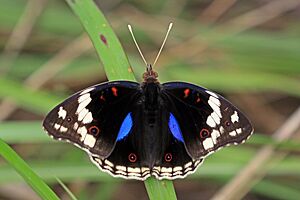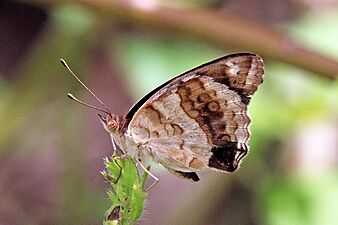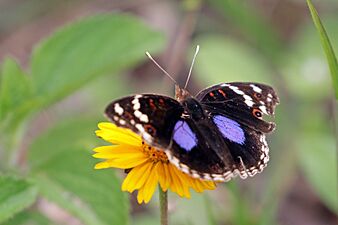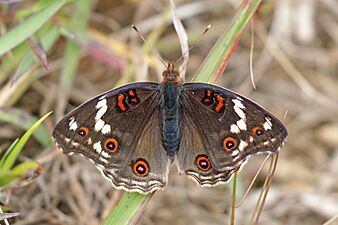Blue pansy facts for kids
The Blue Pansy (scientific name: Junonia oenone) is a beautiful butterfly found in Africa. It's also sometimes called the Dark Blue Pansy. Another butterfly in India, Junonia orithya, is also known as the Blue Pansy, so it can be a bit confusing! This butterfly was first described by Carl Linnaeus in 1758.
Quick facts for kids Blue pansy |
|
|---|---|
 |
|
| A Blue Pansy butterfly in Uganda | |
| Scientific classification |
|
| Kingdom: | Animalia |
| Phylum: | Arthropoda |
| Class: | Insecta |
| Order: | Lepidoptera |
| Family: | Nymphalidae |
| Genus: | Junonia |
| Species: |
J. oenone
|
| Binomial name | |
| Junonia oenone (Linnaeus, 1758)
|
|
| Script error: The function "autoWithCaption" does not exist. | |
Script error: No such module "Check for conflicting parameters".
Contents
Different Kinds of Blue Pansies
The Blue Pansy has a few different types, called subspecies, that live in various places:
- Junonia oenone oenone lives across the main part of Africa.
- Junonia oenone epiclelia is found on islands like Madagascar, Aldabra, Astove, Assumption, and Cosmoledo Island.
-
The underside of a Blue Pansy from Uganda.
-
A male J. o. epiclelia from Madagascar.
-
A female J. o. epiclelia from Madagascar.
What Blue Pansies Look Like
These butterflies have a wingspan of about 40 to 52 millimeters (about 1.5 to 2 inches).
Top Side of Wings
The top of their front wings is mostly black. It has white marks near the tips. The top of their back wings is also black. It has white marks along the outer edge. A special feature is a large, shiny blue spot on the back wings. In female butterflies, this blue spot is often smaller and looks more purple.
Under Side of Wings
The underside of the front wings is brown. It has white marks that match the ones on the top side. The underside of the back wings is almost completely plain brown.
What Blue Pansy Caterpillars Eat
The young caterpillars of the Blue Pansy butterfly eat leaves from several different plants. These plants include Adhatoda densiflora, Mackaya bella, Justicia natalensis, and various types of Asystasia (like A. gangetica), Isoglossa, Pualowilhelmia, and Ruella species.
 | James Van Der Zee |
 | Alma Thomas |
 | Ellis Wilson |
 | Margaret Taylor-Burroughs |




